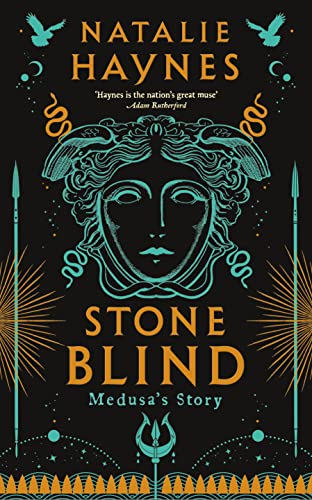Stone Blind
Most of us know something about the ancient Greek myth of Perseus slaying Medusa and making off with her head. The gaze of the snake-haired gorgon had the power to turn people into stone. The storyline was used loosely in the film Clash of the Titans. Young and handsome demigod Perseus, the son of Zeus, the king of the gods, is sent on a quest to find the gorgon and bring back her head. On his return journey, aided by the winged sandals of the messenger god, Hermes, Perseus chances upon Andromeda, the princess of Ethiopia, who is chained to the rocks as a sacrifice to pay for the hubris of her mother, Cassiopeia. The hero rescues the princess, and the pair fall in love.
 Stone Blind turns Medusa’s story on its head (excuse the pun), with the result that the reader empathises with the woman who, since ancient times, has been depicted as a terrible, hideous monster with no heart. In Haynes’s novel, Medusa is a loving sister, violated by the sea god Poseidon and abused from afar by the mean-spirited goddess Athene. And rather than being a dashing, macho hero, Perseus becomes a whining, weak and spoilt brat who achieves his great feats only because he has the reluctant but divine Hermes and Athene on his side. Changing perspectives, tenses, and voices amplifies Medusa’s status as a pawn used by the Olympians to liven up their boring lives. The quick-fire dialogue exchanges are playful and amusing, adding to the novel’s fast pace. There is some very beautiful writing in this novel, particularly the plaintive passages about Medusa and the sweeping, second person sections.
Stone Blind turns Medusa’s story on its head (excuse the pun), with the result that the reader empathises with the woman who, since ancient times, has been depicted as a terrible, hideous monster with no heart. In Haynes’s novel, Medusa is a loving sister, violated by the sea god Poseidon and abused from afar by the mean-spirited goddess Athene. And rather than being a dashing, macho hero, Perseus becomes a whining, weak and spoilt brat who achieves his great feats only because he has the reluctant but divine Hermes and Athene on his side. Changing perspectives, tenses, and voices amplifies Medusa’s status as a pawn used by the Olympians to liven up their boring lives. The quick-fire dialogue exchanges are playful and amusing, adding to the novel’s fast pace. There is some very beautiful writing in this novel, particularly the plaintive passages about Medusa and the sweeping, second person sections.
Haynes has the power to take a familiar myth and reimagine it, enabling us to see Medusa’s story with completely fresh eyes. I absolutely loved this book.










